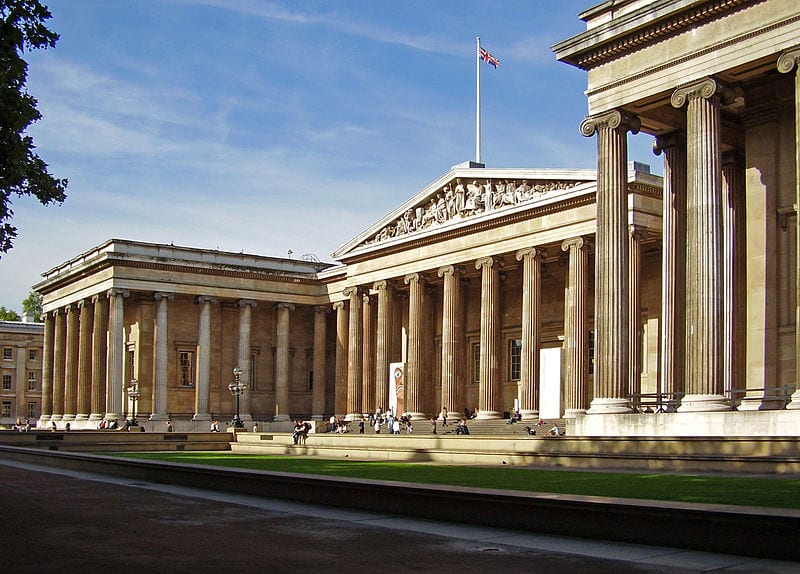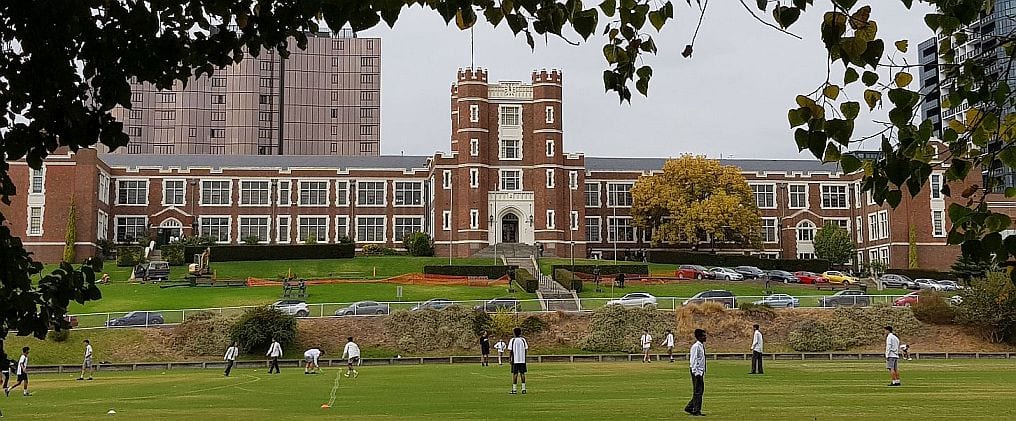
A classical education
Some talk of Alexander, and some of Hercules
Of Hector and Lysander, and such great names as these.
But of all the world’s great heroes, there’s none that can compare
With a tow, row, row, row, row, row, to the British Grenadiers.
Song ‘The New Bath’ (1750), popular in 18th and 19th centuries. It is still played at the ‘Trooping of the Colour’[2]

The British Museum – opened in 1753
Classical architecture, the columns reminiscent of those around the Parthenon of Ancient Greece.
A formal harmony reflecting the Enlightenment principles of reason, logic, and science.
This architecture would be emulated in Australia and other British and European colonies of the time.
Courtesy Wikimedia Commons – Accessed – 3 April 2019
For a general contextual account of classical education see the Wikipedia article on the classical education movement.
Australians, as inheritors of the British culture, are also inheritors of elements of British culture that were derived from ancient Greece and Rome – and that was more than science and philosophy.
Educated Englishmen of the 17th to 19th centuries, the great and dedicated men who administered the Pax Britannica of the British empire – the kind of men who determined and administrated the path of early Australian development – were fully aware of the impressive intellectual achievements of the ancient Greeks and the subsequent economic vitality and social order imposed by the Roman administration of Europe that followed. Such that ‘Many aristocrats of the Georgian period around 1750 still aspired to the lifestyle of a Roman senator of 50 BCE . . . building their houses in styles imitating Roman models’ . . . Americans went further, copying classical institutions ‘like the ‘Senate’ in the ‘Capitol’ building’.[2]
There was no denying the brilliance of Classical art, the depth of Greek philosophy, and the skill of Roman engineering. The world had never seen efficient governance on the scale of the Roman Empire. Though capable of great cruelty, imperial Rome had imposed order on cultural diversity in a period of peace and stability, the ‘Roman Peace’ or Pax Romana.
With the collapse of the Roman Empire, Europe had descended into comparative intellectual stagnation as it withdrew into religious observance, its disunited countries coalescing into warring religious factions. There was nothing to match the economic, artistic, academic, and scientific accomplishments of the Classical world.
Cultural acknowledgement of classical achievements arrived with the European Renaissance and subsequent Enlightenment. England, like other leading European nations, determined to recapture the ethos of this former world by adopting an elite education system based on classical studies (Latin classicus – belonging to the highest class of citizens). The influence of the Classical world on Europe was perhaps most noticeable through the use of Latin as the inter-national language of politics, law, science, philosophy, and religion (still spoken in the Roman Catholic Church) which remained until about the 17th century, being transformed into what we now know as the Romance languages (French, Italian, Spanish, Romanian).
The British empire, of which Australia was but a small part, was the world’s largest empire ever. This period of British ascendancy lasted for 300-500 years and for 100 of these years, from 1815 to 1914, Britain ruled the waves and the world, governing a quarter of its population and over 80% of its land surface.
Educated English gentlemen
Ancient Greek philosopher Plato had envisaged a ruling class of philosopher-kings or guardians. These were future leaders selected in childhood from an aristocratic class. Away from distractions they would be subjected to a rigorous intellectual training as preparation for their future administrative role. Women of the guardian class would be educated in exactly the same way. ‘Truth’ should guide political activity rather than economic circumstance and personal allegiances. Plato‘s guardians would own no private property and would be paid a state salary that would meet basic needs. Families, Plato believed, would also make demands on loyalty that would distract the guardians from affairs of state.
Guardians were therefore an isolated community living and eating together away from the community that they would rule. This vision was very similar to the aristocratic private boarding schools in the British education system at the time of the British Empire.
At elite all-male schools the future gentleman-governors of empire, isolated from their families, were tutored on a heavy diet of Classics that instilled in them the intellectual, political and military ethos of the ancient Greek and Roman cultures. Among their role models were the military and adventuring heroes portrayed in Classical literature – military heroes like Alexander, Hercules, and Lysander and adventurers like Odysseus as portrayed in Homer’s epics the Iliad and Odyssey. Qualities valued included honesty, health, and self-reliance as the young men matured into ‘decent chaps’ with a strong attachment to tradition and religious observance, coupled with a selfless and determined stoical duty to country in the face of adversity (the ‘stiff upper lip’ often associated with a cold detachment and lack of emotional warmth). They were avid readers of the works of Baden Powell (1857-1941), a Charterhouse-educated military officer who served in India and Africa most famous as the founder of the world-wide Scout Movement.
English Philosopher Bertrand Russell notes that Greek culture was based largely on thriving commercial cities and that:
‘Plato, like most Greek philosophers, shared the aristocratic perception that leisure was essential to acquire wisdom and that wisdom was therefore the preserve of those with independent means, that is, people not shackled by the concerns of labouring for a living. Culture was devoted to making men gentlemen, a Platonic idea especially relevant to nineteenth century England where aristocracy enjoyed wealth and prestige but not a monopoly of political power.’[4]
The Grand Tour
A complete Classical education included a familiarization with the great sites and artistic creations of the Mediterranean Classical world, experienced on a traditional ‘grand tour’ of the continent.
The Grand Tour was mostly a British institution that began around 1660, peaking as an Enlightenment diversion from around 1748 to 1789 but losing momentum by 1815. It was a cultural finishing school for the sons of the nobility between the ages of 18 and 25 who travelled with a tutor in literature, history, art, and music and sometimes servants – but it also often included gambling, drunkenness, and debauchery. Crossing the English Channel a carriage was then taken, usually in France or Belgium then, over a period of one to four years, enjoying the major cities of Europe, like Paris and Berlin, but usually spending most time in Italy (Florence, Venice, Milan, Naples) and especially Rome. Assorted artefacts, especially paintings, were gathered and returned for display on family estates. This was an early form of tourism for pleasure, but it was not without risk – from thieves, disease, various forms of travel sickness, and other dangers.

Eton College – Provost’s garden in 2014
Eton has produced 19 British Prime Ministers, the latest being David Cameron (2010 to 2016)
Six weeks before taking his O-Levels Cameron was caught smoking cannabis. He admitted the offence and as he was not selling the drugs, he was not expelled but fined, bounded (confined to the school grounds), and given a ‘Georgic’ (copying 500 lines of Latin text) as punishment[1]
Courtesy Wikimedia Commons
Martin Kraft – Accessed 26 May 2017
Symposia, which we tend to think of as drinking parties, were also tests of manners and etiquette that included strict religious observance and ritual. There was constant attention to personal bearing and skill in discussion. In imperial England similar values were reflected in strict religious observance (regardless of actual beliefs) notably the school ‘assembly’. A sense of fair play, team spirit, and physical courage were fostered on the elite school sporting fields, which were treated as a metaphor for the wider game of life itself, especially the world game of politics . . . ‘Play up! play up! and play the game!’
In Greece only free, land-owning, native-born men could become citizens entitled to the full protection of the law in their city-state. In Athens the population was divided into four social classes based on wealth.
The culture that gave us the idea of democracy (different from present-day idea) was also one that practiced slavery: it was democracy only amongst the privileged elite. In Sparta, all male citizens were given the title of equal only on the proviso that they finished their education. This privileged elite was a profoundly male-dominated culture based on heroic manhood proved through military conquest and athletic prowess. Part of the business of manhood entailed a rich sexual menu that included, for a period, same-sex sexual relations between adult men and adolescent boys known as pederasty or ‘boy love’. This had later echoes in the ‘fagging’ system of elite male British private (‘public’ in a British sense) boarding schools, as a tradition that only ended in the 1970s and 1980s when it was no longer accepted that younger students should act as personal servants to the senior boys in a relationship that could entail sexual abuse and harsh corporal punishment as vividly described in the book Tom Brown’s School Days by Thomas Hughes. This book was published in 1857 at the height of the British Empire and it drew attention to some of the seedier aspects of the Classics-based education system that created Britain’s imperial leaders, a classical tradition no doubt echoing one of Plato’s most powerful ideas developed in the Republic, his Utopia of philosopher kings. The British cabinet, up to recent times, was comprised almost entirely of men educated at Britain’s elite boarding schools.
So, along with the staggering intellectual achievement of ancient Greek society, we must also come to terms with its ambiguities, contradictions, and shortcomings. It was a world of privileged elites (male patricians), domestic servants, slaves, and male-domination. Wives of administrators played little role in society being largely confined to house and garden. Among men, great emphasis was placed on honour, which perpetuated a desire for individual heroism and a collective militaristic imperialism. One area where this tradition is still evident today is in the emulation of the athletic contests that were so popular in the Greek gymnasia and which were so much part of the school life of the British imperial elite (See Sport). The impressive monuments and engineering we associate with Classical culture were consructed using slave labour. Slavery (whether the slaves were abused or treated with consideration) was an unquestioned part of the social structure.
The cultivation of this social elite gave the British leaders an absolute conviction of moral and social superiority and an overwhelming desire to ‘civilize’ their colonial subjects, to present their subjects with a Pax Britannica. It was an attitude that led governing British to acquiesce in the face of slavery and racial atrocities although public pressure in the later stages of empire compensated for this through the Abolitionist movement and a phase of Christian zeal. Intrepid colonial explorers thrived (all Britain admired the plucky adventurers who peopled the empire and penetrated its darker recesses), and missionaries poured into the colonies, especially Africa, to spread the gospel, education, and medicine.
So, from Classical society came not only sharp intellects but also the tradition of domestic servants, sexual inequality, an upstairs/downstairs social structure, and a conviction of intellectual, moral and racial superiority.
A liberal education[3]
British and European colonial expansion no doubt combined both greed and enterprise in the Classical lust for strategic and military power and economic supremacy. It also involved a desire to secure for its citizens both world standing and whatever material comforts could be gained.
The demeanour and outlook of the British gentleman was an integral part of the mix of contradictions that helped forge the modern world – its language, religion, politics, sport, economics, and free trade.
The Enlightenment ‘liberal education’, advocated by people like Thomas Huxley was, at least in principle: critical, open minded, and aware of bias and the influence of ideology. It was claimed to produce the ‘free human being’ who could think individually with an outlook that was broad, global, and pluralistic. Studies would include values, ethics, the capacity for detailed research, and an awareness of the individual’s place in the social and natural world.

Melbourne High School – the ‘Castle’ school building at Forrest Hill, South Yarra
For most of its history a selective entry school for boys in years 9-12.
The boys moved here in 1927 from a former co-ed school in Spring Street, whose female students subsequently moved to Albert Park in 1934 founding MacRobertson Girls’ High School.
Note the similarity in architecture to Eton College.
Image Roger Spencer – 23 April 2019
The modern reaction to wealth, privilege, and education has been an accelerating movement towards egalitarian, democratic, and populist structures and values. In the absence of bureaucratic and structural constraints, and without awareness of the gravity of public administration, Plato’s opinion of democracy as ‘mob rule’ does not sound so far-fetched.
*—
First published on the internet – 1 March 2019
. . . revised 30 October 2020
Eton College – Provost’s garden in 2014
Courtesy Wikimedia Commons
Martin Kraft – Accessed 26 May 2017


